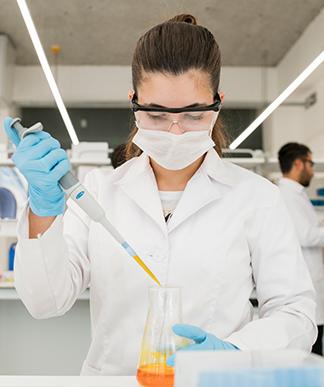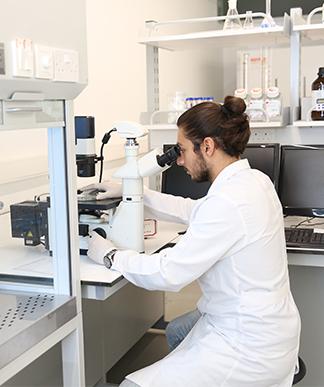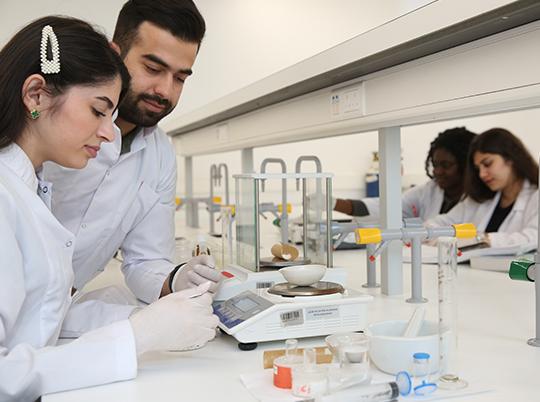


About the Program
Cyprus International University (CIU) Faculty of Pharmacy graduates acquire the title of ‘pharmacist’. The faculty is settled in an innovative Science and Technology Center building which is equipped with the newest high-tech devices in laboratories give importance to both the theoretical knowledge and practical skills. With its qualified academic staff, Faculty of Pharmacy offers lectures in English language and the graduating pharmacists follow scientific developments with the professional ethics using universal perspective.
Educational Opportunities
Cyprus International University (CIU) Faculty of Pharmacy graduates acquire the title of ‘pharmacist’. The faculty is a member of different organizations in both academics and social fields such as the European Pharmaceutical Students Association under the name of CIUPSA. Faculty’s pioneering national and international reputation has been crowned with obtaining accreditation from the Pharmacy Council of Nigeria. The faculty is settled in an innovative Science and Technology Center building which is equipped with the newest high-tech devices in laboratories give importance to both the theoretical knowledge and practical skills. With its qualified academic staff, Faculty of Pharmacy offers lectures in English language and the graduating pharmacists follow scientific developments with the professional ethics using universal perspective.

Accreditations and memberships
The faculty is a member of different organizations in both academic and social fields such as the European Pharmaceutical Students Association under the name of CIUPSA. The faculty’s pioneering national and international reputation has been crowned with obtaining accreditation from the Pharmacy Council of Nigeria. PharmD program’s international quality assurance standards were also evaluated by the Accreditation Agency in Health and Social Sciences (AHPGS), on 30th June 2022, and accredited.
Career Areas
Faculty of Pharmacy graduates play a wide role in health sector. They may work in related departments of health ministries, pharmacies, hospitals and medicine industry. They may also work in R&D laboratories, quality control departments and cosmetics industry. Those who would like to pursue their career in academics, can specialize in the field by doing masters and doctorates.
Contact
Faculty of Pharmacy
Science and Technology Center, ST252
Tel: +90 392 671 1111 Extension: 2651
Faculty E-mail: secretary-phm@ciu.edu.tr
Dean: Prof. Dr. Mustafa Aslan
Dean E-mail: maslan@ciu.edu.tr
Compulsory Courses
First Semester
MEDICAL BIOLOGY
Course code
BIOL120Credit
3Theoretical
3Practical
0Ects
4READING AND WRITING SKILLS-I
Course code
ENGL141Credit
3Theoretical
2Practical
2Ects
4INTRODUCTION TO COMPUTERS
Course code
ITEC110Credit
3Theoretical
3Practical
0Ects
4BASIC MATHEMATICS
Course code
MATH107Credit
2Theoretical
2Practical
0Ects
INTRODUCTION TO PHARMACY
Course code
PHAR105Credit
2Theoretical
2Practical
0Ects
2GENERAL CHEMISTRY FOR PHARMACY
Course code
PHAR110Credit
3Theoretical
3Practical
0Ects
5PHYSICS
Course code
PHYS107Credit
2Theoretical
2Practical
0Ects
3BEHAVIORAL SCIENCES
Course code
PSYC107Credit
2Theoretical
2Practical
0Ects
2TURKISH I:WRITING COMMUNICATION
Course code
TREG113Credit
2Theoretical
2Practical
0Ects
2TURKISH LANGUAGE-I
Course code
TURK101Credit
2Theoretical
2Practical
0Ects
2Second Semester
ANATOMY -PHYSIOLOGY-I
Course code
ANAT110Credit
3Theoretical
3Practical
0Ects
5ORGANIC CHEMISTRY
Course code
CHEM104Credit
3Theoretical
3Practical
0Ects
6READING AND WRITING SKILLS-II
Course code
ENGL142Credit
3Theoretical
2Practical
2Ects
4HISTOLOGY
Course code
HSTG118Credit
1Theoretical
1Practical
0Ects
2ANALYTICAL CHEMISTRY I
Course code
PHAR102Credit
4Theoretical
3Practical
3Ects
5PHARMACEUTICAL AND MEDICAL TERMINOLOGY
Course code
PHAR116Credit
2Theoretical
2Practical
0Ects
3BIOSTATISTICS
Course code
STAT110Credit
2Theoretical
2Practical
0Ects
3TURKISH II:ORAL COMMUNICATION
Course code
TREG114Credit
2Theoretical
2Practical
0Ects
2TURKISH LANGUAGE-II
Course code
TURK102Credit
2Theoretical
2Practical
0Ects
2Third Semester
ANATOMY- PHYSIOLOGY-II
Course code
ANAT120Credit
3Theoretical
3Practical
0Ects
4BIOCHEMISTRY
Course code
CHEM213Credit
3Theoretical
3Practical
0Ects
3PUBLIC HEALTH
Course code
HELS211Credit
2Theoretical
2Practical
0Ects
2HISTORY OF CIVILIZATION-I
Course code
HIST101Credit
2Theoretical
2Practical
0Ects
2ANALYTICAL CHEMISTRY II
Course code
PHAR201Credit
4Theoretical
3Practical
3Ects
5PHARMACEUTICAL MICROBIOLOGY
Course code
PHAR205Credit
4Theoretical
3Practical
3Ects
5PHARMACY PRACTICE
Course code
PHAR207Credit
2Theoretical
2Practical
0Ects
3ATATÜRK PRINCIPLES AND HISTORY OF TURKISH REFORMS-I
Course code
TARH101Credit
2Theoretical
2Practical
0Ects
2UNIVERSITY ELECTIVE
Course code
UNIEXX1Credit
3Theoretical
3Practical
0Ects
6Fourth Semester
HISTORY OF CIVILIZATION-II
Course code
HIST102Credit
2Theoretical
2Practical
0Ects
2PATHOLOGY
Course code
PATH216Credit
2Theoretical
2Practical
0Ects
3PHARMACEUTICAL TECHNOLOGY-I
Course code
PHAR202Credit
4Theoretical
3Practical
3Ects
6PHARMACEUTICAL CHEMISTRY-I
Course code
PHAR206Credit
4Theoretical
3Practical
3Ects
5IMMUNOLOGY
Course code
PHAR208Credit
2Theoretical
2Practical
0Ects
4PHARMACOLOGY-I
Course code
PHAR210Credit
4Theoretical
4Practical
0Ects
6PHARMACEUTICAL BOTANY
Course code
PHAR212Credit
4Theoretical
3Practical
3Ects
4ATATÜRK PRINCIPLES AND HISTORY OF TURKISH REFORMS-II
Course code
TARH102Credit
2Theoretical
2Practical
0Ects
2Fifth Semester
CLINICAL BIOCHEMISTRY
Course code
BCHM309Credit
3Theoretical
2Practical
3Ects
4INTERNSHIP-I
Course code
PHAR200Credit
0Theoretical
0Practical
0Ects
3PHARMACOGNOSY-I
Course code
PHAR301Credit
4Theoretical
3Practical
3Ects
5PHARMACEUTICAL CHEMISTRY-II
Course code
PHAR303Credit
3Theoretical
2Practical
3Ects
4PHARMACEUTICAL TECHNOLOGY-II
Course code
PHAR305Credit
4Theoretical
3Practical
3Ects
5PHARMACOLOGY-II
Course code
PHAR307Credit
2Theoretical
2Practical
0Ects
3AREA ELECTIVE
Course code
PHARXX1Credit
2Theoretical
2Practical
0Ects
6Sixth Semester
FIRST AID
Course code
FAID300Credit
2Theoretical
2Practical
0Ects
2FREE ELECTIVE
Course code
FREEXX1Credit
2Theoretical
2Practical
0Ects
6PHARMACOGNOSY-II
Course code
PHAR302Credit
3Theoretical
2Practical
3Ects
3PHARMACEUTICAL CHEMISTRY-III
Course code
PHAR304Credit
3Theoretical
2Practical
3Ects
3PHARMACEUTICAL TECHNOLOGY-III
Course code
PHAR306Credit
4Theoretical
3Practical
3Ects
5PHARMACEUTICAL TOXICOLOGY-I
Course code
PHAR308Credit
2Theoretical
2Practical
0Ects
2PHARMACOLOGY-III
Course code
PHAR310Credit
2Theoretical
2Practical
0Ects
3AREA ELECTIVE
Course code
PHARXX2Credit
2Theoretical
2Practical
0Ects
6Seventh Semester
FREE ELECTIVE
Course code
FREEXX2Credit
2Theoretical
2Practical
0Ects
6INTERNSHIP-II
Course code
PHAR300Credit
0Theoretical
0Practical
0Ects
3PHARMACEUTICAL TECHNOLOGY-IV
Course code
PHAR403Credit
4Theoretical
3Practical
3Ects
4PHARMACEUTICAL TOXICOLOGY-II
Course code
PHAR405Credit
3Theoretical
2Practical
3Ects
3CLINICAL PHARMACY AND PHARMACEUTICAL CARE-I
Course code
PHAR409Credit
3Theoretical
3Practical
0Ects
3AREA ELECTIVE
Course code
PHARXX3Credit
2Theoretical
2Practical
0Ects
6UNIVERSITY ELECTIVE
Course code
UNIEXX2Credit
3Theoretical
3Practical
0Ects
6Eighth Semester
FREE ELECTIVE
Course code
FREEXX3Credit
2Theoretical
2Practical
0Ects
6PHARMACY LEGISLATIONS
Course code
PHAR406Credit
2Theoretical
2Practical
0Ects
2CLINICAL PHARMACY AND PHARMACEUTICAL CARE-II
Course code
PHAR408Credit
3Theoretical
3Practical
0Ects
5PHYTOTHERAPY
Course code
PHAR412Credit
2Theoretical
2Practical
0Ects
2DEONTOLOGY AND ETHICS
Course code
PHAR414Credit
2Theoretical
2Practical
0Ects
2AREA ELECTIVE
Course code
PHARXX4Credit
2Theoretical
2Practical
0Ects
6UNIVERSITY ELECTIVE
Course code
UNIEXX3Credit
3Theoretical
3Practical
0Ects
6Ninth Semester
FREE ELECTIVE
Course code
FREEXX4Credit
2Theoretical
2Practical
0Ects
6INTERNSHIP-III
Course code
PHAR400Credit
7Theoretical
0Practical
14Ects
3GRADUATION PROJECT-I
Course code
PHAR501Credit
4Theoretical
0Practical
8Ects
5COMMUNITY AND HOSPITAL PHARMACY SERVICES
Course code
PHAR507Credit
3Theoretical
3Practical
0Ects
4AREA ELECTIVE
Course code
PHARXX5Credit
2Theoretical
2Practical
0Ects
6AREA ELECTIVE
Course code
PHARXX6Credit
2Theoretical
2Practical
0Ects
6Tenth Semester
GRADUATION PROJECT-II
Course code
PHAR502Credit
6Theoretical
0Practical
12Ects
15INTERNSHIP-IV
Course code
PHAR504Credit
6Theoretical
0Practical
12Ects
15Eleventh Semester
COMMUNITY PHARMACY PRACTICE
Course code
PHAR601Credit
4Theoretical
0Practical
8Ects
8HOSPITAL PHARMACY PRACTICE
Course code
PHAR603Credit
4Theoretical
0Practical
8Ects
8INDUSTRIAL PHARMACY PRACTICE
Course code
PHAR605Credit
4Theoretical
0Practical
8Ects
8THESIS PROJECT
Course code
PHAR607Credit
3Theoretical
0Practical
6Ects
6Twelfth Semester
COMMUNITY PHARMACY CLERKSHIP
Course code
PHAR602Credit
4Theoretical
0Practical
8Ects
10HOSPITAL PHARMACY CLERKSHIP
Course code
PHAR604Credit
4Theoretical
0Practical
8Ects
10INDUSTRIAL PHARMACY CLERKSHIP
Course code
PHAR606Credit
4Theoretical
0Practical
8Ects
10Elective Courses
INTRODUCTION TO PHARMACEUTICAL TECHNOLOGY
Course code
PHAR217Credit
2Theoretical
2Practical
0Ects
2PHARMACEUTICAL NOMENCLATURE
Course code
PHAR313Credit
2Theoretical
2Practical
0Ects
2ETHNOBOTANY
Course code
PHAR114Credit
2Theoretical
2Practical
0Ects
COSMETOLOGY
Course code
PHAR410Credit
2Theoretical
2Practical
0Ects
6DRUG SAFETY AND RISK ASSESSMENT IN DRUG USE
Course code
PHAR425Credit
2Theoretical
2Practical
0Ects
0PHARMACY IN UNITED STATES OF AMERICA
Course code
PHAR429Credit
2Theoretical
2Practical
0Ects
2PHARMACOECONOMICS
Course code
ECON407Credit
2Theoretical
2Practical
0Ects
6PHARMACOVIGILANCE AND DRUG INTERACTIONS
Course code
PHAR421Credit
2Theoretical
2Practical
0Ects
NON-PRESCRIPTION DRUG (OTC)
Course code
PHAR315Credit
2Theoretical
2Practical
0Ects
2TOXICOLOGICAL SIGNIFICANCE OF DRUG USE IN LIFE STAGES
Course code
PHAR426Credit
2Theoretical
2Practical
0Ects
0ONCOLOGY PHARMACY
Course code
PHAR521Credit
2Theoretical
2Practical
0Ects
1BIOPHARMACEUTICS PHARMACOKINETICS
Course code
PHAR402Credit
2Theoretical
2Practical
0Ects
6PHARMACEUTICAL BIOTECHNOLOGY
Course code
PHAR401Credit
2Theoretical
2Practical
0Ects
6PRINCIPLES OF PHARMACEUTICAL CARE
Course code
PHAR417Credit
2Theoretical
2Practical
0Ects
CELL CULTURE TECHNIQUES
Course code
PHAR424Credit
2Theoretical
2Practical
0Ects
NEGLECTED TROPICAL DISEASES
Course code
PHAR519Credit
2Theoretical
2Practical
0Ects
PHARMACEUTICAL AND MEDICAL TERMINOLOGY
Course code
PHAR116Credit
2Theoretical
2Practical
0Ects
2PHARMACOGENETICS AND PHARMACOGENOMICS
Course code
PHAR427Credit
2Theoretical
2Practical
0Ects
2DRUG ANALYSIS I
Course code
PHAR293Credit
2Theoretical
2Practical
0Ects
2DRUG DESIGN
Course code
PHAR511Credit
2Theoretical
2Practical
0Ects
2Neurophysiology
Course code
PHAR291Credit
2Theoretical
2Practical
0Ects
LITERATURE SURVEY
Course code
PHAR404Credit
2Theoretical
2Practical
0Ects
3OXIDATION AND ANTIOXIDATION
Course code
PHAR503Credit
2Theoretical
2Practical
0Ects
2PROTEIN PRODUCTION BY RECOMBINANT DNA TECHNOLOGY
Course code
PHAR422Credit
2Theoretical
2Practical
0Ects
TARGETED DRUG DELIVERY SYSTEMS
Course code
PHAR517Credit
2Theoretical
2Practical
0Ects
MEDICAL LAW
Course code
PHAR423Credit
2Theoretical
2Practical
0Ects
2Applicants can directly apply online to our undergraduate programs by using the application portal. Please fill in your details correctly and upload all the required documents listed on the last page of the application form.
Required documents;
- Completed application form,
- Higher/Secondary Certificate or equivalents (e.g. O/A’Level, WAEC/NECO)
- Evidence of English Language competence: TOEFL (65 IBT) or IELTS (5.5). Students without these documents will take the CIU English proficiency exam on campus following arrival,
- Scanned copy of international passport/birth certificate,
- Fully completed and signed CIU Rules and Regulations document (which can be downloaded during the online application).
Cyprus International University provides academic scholarships for its students as an incentive for success, with most students benefiting from 50%, 75% or 100% scholarships or discounted tuition fees. Click for more information.
Tuition Fees are determined at the beginning of each academic year. Candidate students who are entitled to enroll in CIU can learn their fees in line with the Tuition Fee Calculation system.